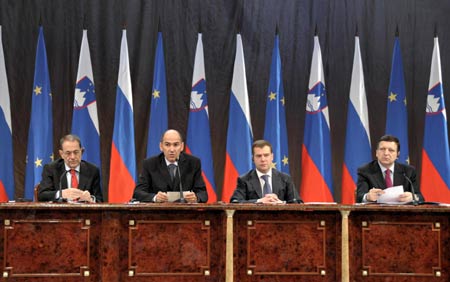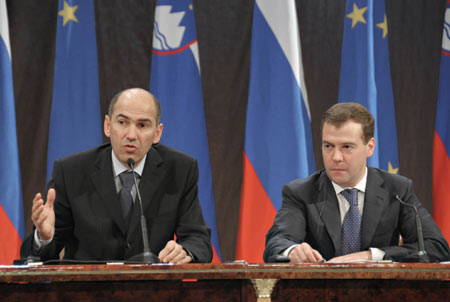
European Commission President Jose Manuel Barroso, Russian President Dmitry Medvedev, Prime Minister Janez Jansa of Slovenia and European Union foreign policy chief Javier Solana (R-L) meet the media after the two-day Russia-EU summit in Khanty-Mansiysk, central Russia, June 27, 2008. Russia and the EU announced here Friday that they will open talks on new strategic relations in coming days.(Xinhua Photo)
The Russia-EU summit concluded Friday in Russia's West Siberian city of Khanty-Mansiysk, with the issuing of a joint statement saying that Russia and the European Union (EU) will hold the first round of talks on new strategic relations in Brussels on July 4.
The leaders of the EU and Russia Friday launched talks on a new agreement that will replace the current Partnership and Cooperation Agreement (PCA), which entered into force on Dec. 1, 1997, according to the joint statement.
The new agreement will be built on international obligations binding Russia and the EU, and will contain corresponding institutional clauses to ensure the effectiveness of Russia-EU cooperation, it said.

Russian President Dmitry Medvedev meets the media after the two-day Russia-European Union summit in Khanty-Mansiysk, central Russia, June 27, 2008. Russia and the EU announced here Friday that they will open talks on new strategic relations in coming days.(Xinhua Photo)
The existing 10-year agreement signed in 1997 has automatically renewed because of the delays on reaching a new one.
"The new accord will be a brief framework agreement, without excessive details. It will place an emphasis on the strategic character of our relations. The document will be supplemented by a system of sectorial agreements," Russian president Dmitry Medvedev told a press conference after the summit.
Medvedev reiterated his idea of holding a common European summit to prepare a European security agreement, which is seen as an effort to reduce the EU's security dependence on the United States.
Medvedev said that none of the current European organizations, including the OSCE, the EU or NATO, is capable of solving the problem of European security. "European security must not fall apart into blocs," he said.
In his opinion, the U.S. plans to deploy missile defense sites in Europe will hurt European security.
"We hold an extremely skeptical attitude toward the idea. We believe it is harmful and not consistent with the goal of maintaining either security on the European continent or global security," Medvedev said.

Russian President Dmitry Medvedev (R) and Prime Minister Janez Jansa of Slovenia, which currently holds the rotating European Union presidency, meet the media after the two-day Russia-EU summit in Khanty-Mansiysk, central Russia, June 27, 2008. Russia and the EU announced here Friday that they will open talks on new strategic relations in coming days.(Xinhua Photo)
Energy security remains a core issue in Russia-EU relations. European Commission President Jose Manuel Barroso said Russia and the EU are interdependent in this era of high energy prices. "Russia remains a key energy supplier for the EU, the EU will remain Russia's most important export market," he said.
Medvedev agreed that energy is an important element in Russia-EU cooperation, and Prime Minister Janez Jansa of Slovenia, which currently holds the rotating EU presidency, said energy cooperation between Russia and the EU will be intensified.
Medvedev said Russia would continue with plans to build new North Stream and South Stream natural gas pipelines under the Baltic and Black Seas.
"This is a commercial project, and should not be politicized," Medvedev said of the North Stream pipeline to Germany, which is being built by the Russian energy giant Gazprom and Germany's E.ON.
The first of North Stream's two parallel pipelines, approximately 1,200 kms long, with a transporting capacity of some27.5 billion cubic meters per year, is to become operational in 2010. In the second phase, capacity will be doubled to about 55 billion cubic meters per year.
However, Barroso said the EU will only support the North Stream gas pipeline project when it complies with EU environmental laws.
(Xinhua News Agency June 28,2008)